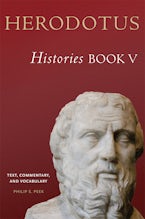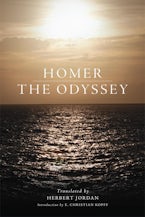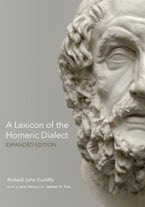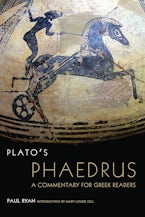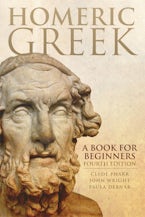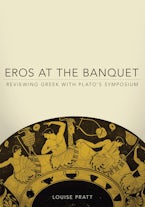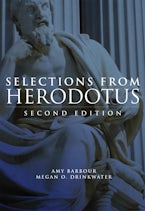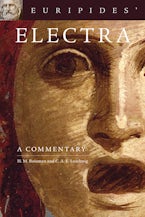FOREIGN LANGUAGE STUDY / Greek (Modern)
Showing results 1-10 of 24
Filter Results OPEN +

Herodotus, Histories, Book V
Text, Commentary, and Vocabulary
Book V of the Histories focuses on the Persians and their expansion into Thrakia and Makedonia, as well as their conflict with the Greeks of Ionia. Beginning in the timeless legends of prehistory, Herodotus discusses the customs of the Thrakians, offers insight into Sparta’s mindset, and narrates the struggle to restore democracy at Athens after the reign of the tyrant Peisistratos.
Views of Rome
A Greek Reader
Designed for advanced undergraduate– and graduate-level readers of Greek, this student-friendly book bridges the worlds of Greece and Rome and inspires discussion of identity, empire, religion, and politics—matters much debated in classical antiquity and in the present day.
Communication, Love, and Death in Homer and Virgil
An Introduction
Homer’s Iliad and Odyssey and Virgil’s Aeneid are three of the most important—and influential—works of Western classical literature. Although they differ in subject matter and authorship, these epic poems share a common purpose: to tell the “deeds both of men and of the gods.” Written in an accessible style and ideally suited for classroom use, Communication, Love, and Death in Homer and Virgil offers a unique comparative analysis of these classic works.
The Odyssey
One of the two major ancient Greek epics, Homer’s Odyssey, has been a classic of Western Literature for centuries. This new translation into spare, elegant blank verse, is certain to attract the same praise and admiration as Herbert Jordan’s translation of Homer’s Iliad.
This edition features maps of the Aegean region and Odysseus’ travels, explanatory notes, a pronunciation glossary of nouns, and an index of similes.
A Lexicon of the Homeric Dialect
Expanded Edition
For nearly a century, Richard John Cunliffe’s Lexicon of the Homeric Dialect has served as an invaluable resource for students and scholars of Homer’s Iliad and Odyssey. As both an English-Homeric dictionary and a concordance, the Lexicon lists and defines in English all instances of Greek words that appear in the two epics. Now, with the inclusion of Cunliffe’s “Homeric Proper and Place Names”—a forty-two page supplement to the Lexicon—this expanded edition will be even more useful to readers of Homer.
Plato's Phaedrus
A Commentary for Greek Readers
Drawing on his extensive classroom experience and linguistic expertise, Paul Ryan offers a commentary that is both rich in detail and—in contrast to earlier, more austere commentaries on the Phaedrus—fully engaging. Line by line, he explains subtle points of language, explicates difficulties of syntax, and brings out nuances of tone and meaning that students might not otherwise notice or understand.
Homeric Greek
A Book for Beginners
For many years, Homeric Greek has been a standard textbook for first-year Greek courses in college and preparatory schools. It offers students the exciting experience of learning to read a Homeric poem in the original language, while introducing them to the fundamentals of ancient Greek. This fourth edition addresses the needs of today’s teachers and students, while retaining those elements of the original book responsible for its longevity.
Eros at the Banquet
Reviewing Greek with Plato's Symposium
After studying ancient Greek for a year, students often become discouraged when presented with unabridged classical texts that offer only minimal supportive apparatus. In welcome contrast, this intermediate-level textbook reinforces the first-year lessons and enables students to read Plato's Symposium, one of the most engaging works in Attic Greek, the dialect taught in most first-year courses. Instructors may also supplement this volume with Pratt's The Essentials of Greek Grammar: A Reference for Intermediate Readers of Attic Greek, which includes many examples from the Symposium.
Selections from Herodotus
The writings of Herodotus, historian, observer, and delightful storyteller, have long been favorites among teachers and students of the Greek language. The selections in this book will provide reading in the second year for the student who has begun his or her Greek with Homer and who presumably has had no acquaintance with Attic Greek. This second Oklahoma edition is enhanced by Megan O. Drinkwater's addition of chapter and section references to the complete works of Herodotus.
Euripides' Electra
A Commentary
Among the best-known Greek tragedies, Electra is also one of the plays students of Greek often read in the original language. It tells the story of how Electra and her brother, Orestes, avenge the murder of their father, Agamemnon, by their mother and her lover. H. M. Roisman and C. A. E. Luschnig have developed a new edition of this seminal tragedy designed for twenty-first-century classrooms. Included with the Greek text are a useful introduction, line-by-line commentary, and other materials in English, all intended to support intermediate and advanced undergraduate students.

Herodotus, Histories, Book V
Text, Commentary, and Vocabulary
Book V of the Histories focuses on the Persians and their expansion into Thrakia and Makedonia, as well as their conflict with the Greeks of Ionia. Beginning in the timeless legends of prehistory, Herodotus discusses the customs of the Thrakians, offers insight into Sparta’s mindset, and narrates the struggle to restore democracy at Athens after the reign of the tyrant Peisistratos.
Views of Rome
A Greek Reader
Designed for advanced undergraduate– and graduate-level readers of Greek, this student-friendly book bridges the worlds of Greece and Rome and inspires discussion of identity, empire, religion, and politics—matters much debated in classical antiquity and in the present day.
Communication, Love, and Death in Homer and Virgil
An Introduction
Homer’s Iliad and Odyssey and Virgil’s Aeneid are three of the most important—and influential—works of Western classical literature. Although they differ in subject matter and authorship, these epic poems share a common purpose: to tell the “deeds both of men and of the gods.” Written in an accessible style and ideally suited for classroom use, Communication, Love, and Death in Homer and Virgil offers a unique comparative analysis of these classic works.
The Odyssey
One of the two major ancient Greek epics, Homer’s Odyssey, has been a classic of Western Literature for centuries. This new translation into spare, elegant blank verse, is certain to attract the same praise and admiration as Herbert Jordan’s translation of Homer’s Iliad.
This edition features maps of the Aegean region and Odysseus’ travels, explanatory notes, a pronunciation glossary of nouns, and an index of similes.
This edition features maps of the Aegean region and Odysseus’ travels, explanatory notes, a pronunciation glossary of nouns, and an index of similes.
A Lexicon of the Homeric Dialect
Expanded Edition
For nearly a century, Richard John Cunliffe’s Lexicon of the Homeric Dialect has served as an invaluable resource for students and scholars of Homer’s Iliad and Odyssey. As both an English-Homeric dictionary and a concordance, the Lexicon lists and defines in English all instances of Greek words that appear in the two epics. Now, with the inclusion of Cunliffe’s “Homeric Proper and Place Names”—a forty-two page supplement to the Lexicon—this expanded edition will be even more useful to readers of Homer.
Plato's Phaedrus
A Commentary for Greek Readers
Drawing on his extensive classroom experience and linguistic expertise, Paul Ryan offers a commentary that is both rich in detail and—in contrast to earlier, more austere commentaries on the Phaedrus—fully engaging. Line by line, he explains subtle points of language, explicates difficulties of syntax, and brings out nuances of tone and meaning that students might not otherwise notice or understand.
Homeric Greek
A Book for Beginners
For many years, Homeric Greek has been a standard textbook for first-year Greek courses in college and preparatory schools. It offers students the exciting experience of learning to read a Homeric poem in the original language, while introducing them to the fundamentals of ancient Greek. This fourth edition addresses the needs of today’s teachers and students, while retaining those elements of the original book responsible for its longevity.
Eros at the Banquet
Reviewing Greek with Plato's Symposium
After studying ancient Greek for a year, students often become discouraged when presented with unabridged classical texts that offer only minimal supportive apparatus. In welcome contrast, this intermediate-level textbook reinforces the first-year lessons and enables students to read Plato's Symposium, one of the most engaging works in Attic Greek, the dialect taught in most first-year courses. Instructors may also supplement this volume with Pratt's The Essentials of Greek Grammar: A Reference for Intermediate Readers of Attic Greek, which includes many examples from the Symposium.
Selections from Herodotus
The writings of Herodotus, historian, observer, and delightful storyteller, have long been favorites among teachers and students of the Greek language. The selections in this book will provide reading in the second year for the student who has begun his or her Greek with Homer and who presumably has had no acquaintance with Attic Greek. This second Oklahoma edition is enhanced by Megan O. Drinkwater's addition of chapter and section references to the complete works of Herodotus.
Euripides' Electra
A Commentary
Among the best-known Greek tragedies, Electra is also one of the plays students of Greek often read in the original language. It tells the story of how Electra and her brother, Orestes, avenge the murder of their father, Agamemnon, by their mother and her lover. H. M. Roisman and C. A. E. Luschnig have developed a new edition of this seminal tragedy designed for twenty-first-century classrooms. Included with the Greek text are a useful introduction, line-by-line commentary, and other materials in English, all intended to support intermediate and advanced undergraduate students.

